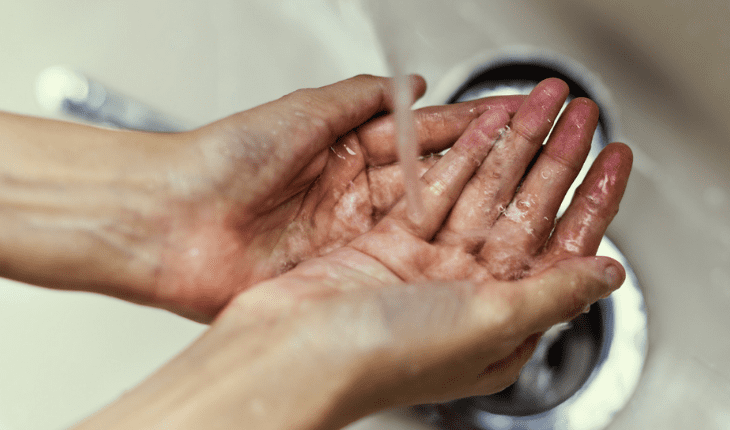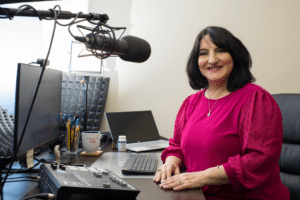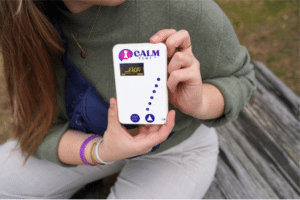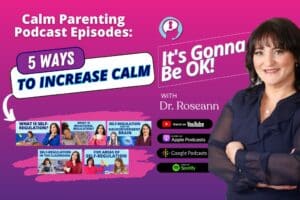OCD is on the rise and people are turning to supplements for OCD to get relief. There are some promising studies that support its efficacy.
Obsessive-Compulsive Disorder (OCD) is a disorder that afflicts 2.3 percent of the US population. While most people associate the disorder with OCD cleaning, the uncontrollable and recurring obsessions people feel the urge to repeat over and over also include thoughts and other compulsive behaviors It is a mental health issue that can affect someone for their lifetime and benefits from a form of psychotherapy that combines cognitive behavior therapy (CBT) and exposure therapy called Exposure Response and Prevention Therapy (E/RP). OCD can also be severe with high nonresponse and relapse rates, as well as poor response to pharmacological interventions.
People often want to know what is the most successful herb for OCD or specific herbs for intrusive thoughts or compulsive behaviors but a holistic treatment plan for OCD should involve multiple components and most likely multiple herbs and holistic treatments such as neurofeedback for OCD. Promising research into complementary and alternative medicine indicates these 5 supplements for OCD should be considered to reduce symptoms.
Looking for information on what the research says what dosages of these herbs and supplements your child should be taking?
Supplements for Obessive Compulsive Disorder
Natural remediies for OCD vary from supplements to essential oil and therapy. The best natural cure for OCD is a combination of calming the brain and an OCD therapy called Exposure and Response prevention. Natural cures for OCD can be helpful but the behavioral habituation of the OCD must be addressed with therapy.
While these are OTC anxiety medications, they can also be natural anxiety medication for children under the guidance of an expert who is teaching you and your child how to stop thoughts naturally.
NAC for OCD is an amino acid derivative of cysteine that has antioxidant effects and supports brain function, as well as has anti-inflammatory properties. NAC helps the body synthesize glutathione, an important antioxidant necessary for detoxification of the liver. Moreover, because of the organic compounds of the sulfhydryl groups, NAC protects the body from different toxins as it can bind and inactivate toxic heavy metals, drugs like acetaminophen, environmental pollutants, herbicides, mercury, cadmium, lead, microbes, etc. High toxin loads create an inflammatory response in the brain and body and can lead to a variety of mental health issues, including obessive compulsive disorder.
NAC modulates the expression of genes that affect the inflammatory process. With obessive compulsive disorder, inflammation and excess neurotransmitter activity has been implicated in the occurrence of OCD. Research supports that NAC is an effective dietary supplement for those with OCD, as NAC reduces inflammation and inhibits the release of excitatory neurotransmitters. It inhibits the expression of pro-inflammatory cytokines and, suppresses pro-inflammatory signaling pathway NF-kappa B, and regulates the gene for cyclooxygenase-2 (COX-2), which promotes carcinogenesis, thereby preventing inflammation and pain.
NAC also targets the glutamatergic system. Research suggests that the excitatory neurotransmitter glutamate is dysregulated in OCD patients and that this dysregulation may contribute to the behaviors. NAC stimulates inhibitory metabotropic glutamate receptors, which then reduces the synaptic release of glutamate. The restoration of the extracellular glutamate concentration in the nucleus accumbens seems to block reinstitution of compulsive behaviors and helps in reducing OCD symptoms.
Glycine and The OCD Brain
Glycine is a naturally occurring amino acid that supports nerve and neurotransmitter functions and is an OCD natural remedy. It helps support the detoxification process, assists with cellular energy, and supports intestinal and brain health, all important factors in OCD. It is made in small amounts by the human body but is also acquired through food and supplements. The highest sources of glycine are found in collagen, gelatin, and high protein meats, as well as can also be found in bone broth.
This amino acid is important for different muscle, cognitive, and metabolic functions. Strong gut health is important for brain health. Glycine inhibits oxidative stress, which can interfere with intestinal health. Glycine enables the production of collagen, a protein that is an essential component of muscles, tendon, skin, and bones. It also facilitates the production of creatine, a nutrient stored in and used by the brain for energy. Glycine helps break down and transport nutrients like glycogen and fat to be used by cells for energy thus supporting the brain and in the process, it supports a strong immune, digestive, and nervous system.
We know from research that bacteria can be a source of obsessive-compulsive behaviors, which results in a disorder called PANDAS when from a streptococcus infection and is called PANS when from other infectious sources. With the detoxification process, Glycine is necessary for the synthesis of bile salts, which is needed for the excretion of toxins from the body and inhibiting pathogenic bacterial overgrowth.
Glycine is involved in the transmission of chemical signals in the brain with both inhibitory and excitatory functions within the central nervous system (CNS). Glycine works with other amino acids, including taurine and gamma-aminobutyric acid GABA, as an inhibitory neurotransmitter. Also, it binds to the NMDA receptor, which is an excitatory receptor site for glutamate, thus inducing a sedative or inhibitory effect, while also being capable of improving mood and cognition. Moreover, research indicates that it may be effective as one of the supplements for OCD patients.
Milk Thistle: An Herbal Treatment for Obsessive Compulsive Disorder
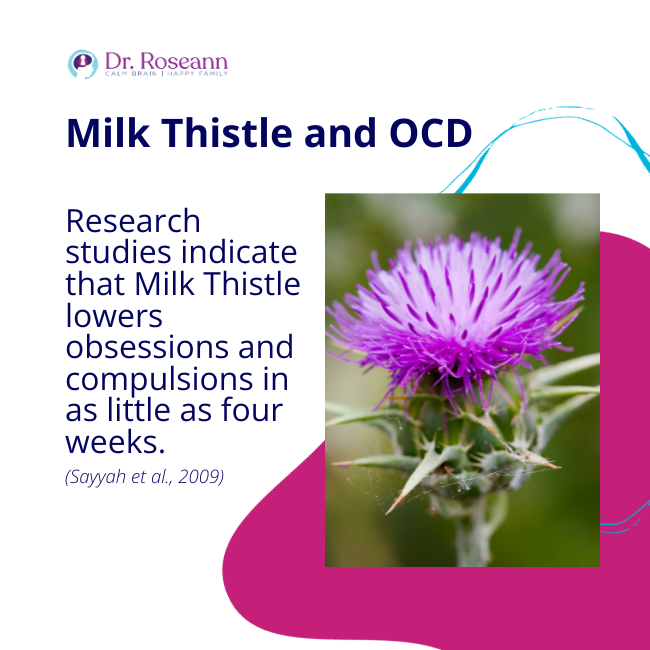
Milk thistle is a plant whose fruit and seeds have been used for more than 2,000 years to support the liver. One of the active ingredients in milk thistle is silymarin, which is extracted from the plant's seeds and fruits. Silymarin is a complex mixture of flavonolignans that have antioxidant properties. Research demonstrates that silymarin stabilizes cellular membranes and regulates permeability to stimulate detoxification pathways
Using milk thistle, obessive compulsive disorder patients enable detoxification which promotes better mental health. Milk Thistle is a strong liver detoxifier. As we learn more about mental health, we know that poor detoxification can lead to issues. When toxins build up in the brain or body, these toxins can create or contribute to significant psychiatric symptoms like OCD. Specifically, it supports phase 2 liver detoxification, which is needed to remove toxins from the body.
Milk Thistle increases serotonin and those with OCD may have abnormalities in their serotonin (5-HT) system. Research studies indicate that Milk Thistle lowers obsessions and compulsions in as little as four weeks.
L-Theanine and Calming Neurotransmitters
L-Theanine is an amino acid found in green tea and is widely used in Asian countries. It is known for its calming and relaxing properties and used to treat both anxiety and depression. It is often considered a natural medication for OCD and anxity.
L-Theanine supports neurocognitive functioning in several ways, supporting both neurotransmitter functioning and brainwave activity and in the case of obessive compulsive disorder, helping to calm the brain. L-theanine modulates aspects of brain function in humans by increasing Alpha brainwave activity, which calms the brain.
L-theanine increases levels of the brain neurotransmitters serotonin, dopamine, and gamma-aminobutyric acid (GABA) (an important inhibitory neurotransmitter). L-theanine produces its anti-anxiety effects by increasing GABA without producing sleepiness or impairing motor behavior common to prescription anti-anxiety drugs. L-Theanine reduces anxiety by blocking the excitatory neurotransmitter glutamate. By inhibiting the overstimulating glutamate, the brain learns to calm and one feels more relaxed, which helps to reduce symptoms associated with OCD.
For those chronic stress, studies demonstrate that L-theanine can specifically reduce the molecular impacts of acute stress, and the resulting excitotoxicity, on brain cells, which can result in cognitive decline. It has been found to support healthy neurotransmitter activity to reduce behaviors associated with OCD. It can be directly taken in capsule or powder form. L-Theanine is considered safe and no negative effects have been found in research making green tea one of the primary herbs for obessive compulsive disorder patients.
Inositol and Symptom Reduction
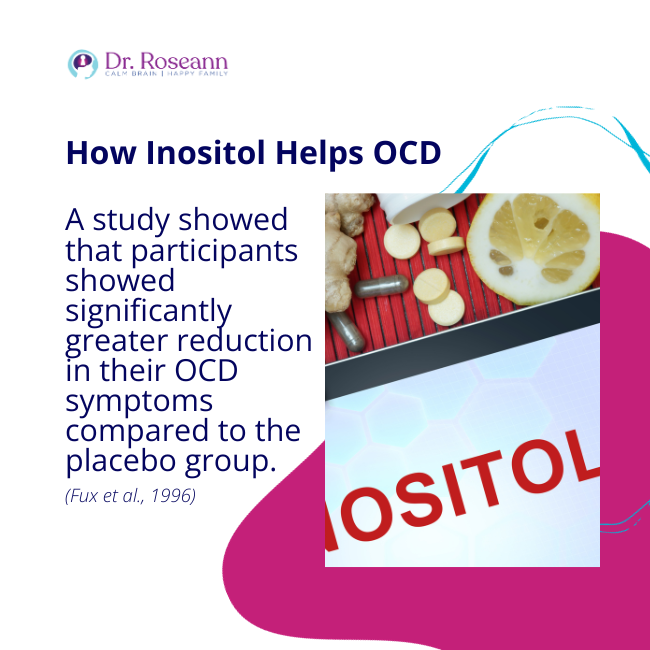
Inositol is a naturally occurring substance that is also called Vitamin B8 but isn’t categorized as a B vitamin. The B vitamin-like substance can be found naturally in plants and animals or can be man-made. It can be found in fruits like oranges, cantaloupe, and bananas, as well as in wheat germ, brewer’s yeast, liver, brown rice, oat flakes, nuts, unrefined molasses, raisins, and vegetables.
It is necessary for proper cell formation, nerve transmission and transportation of fats in the body. Inositol may affect the action of the neurotransmitters serotonin and GABA metabolism and therefore has a role in many psychiatric disorders. This serotonin supplement can help with brain functioning.
Inositol is a nutrient used to promote brain wellness, relaxation, and restful sleep. It is a natural treatment for OCD and anxiety. Research has found positive effects of inositol treatment in reducing anxiety, depression, and obsessions and compulsions. In a 1996 study researching Inositol for OCD patients, the subjects had significantly lower scores on the Yale-Brown Obsessive Compulsive Scale when taking inositol.
In this 1996 double-blind and placebo-controlled, randomly assigned adult participants received either inositol (18 grams daily divivded into two to three doses) or a placebo for six weeks. The results showed that the group receiving inositol had a significantly greater reduction in their OCD symptoms compared to the placebo group, leading the authors to conclude that inositol may be a safe and effective option for reducing symptoms of OCD (Fux et al., 1996).
In my clinical experience, dividing the inositol dose into two to three doses is key in reducing symptoms. Many of my PANS/PANDAS OCD cases, in particular, have seen the benefit when the dose is divided. Our BrainBehaviorReset™ Program clients with OCD often add inositol to their protocol, and some increase the dose if they are already taking it but not seeing the desired benefits.
There have been no documented cases of drug interactions in studies. Some gastrointestinal bloating may be a side effect for some people but inositol OCD is generally well tolerated and reportedly safe.
As patients seek obessive compulsive disorder treatment without medication, they seek complementary and alternative treatments. Coupled with Exposure and Response Therapy (E/RP), supplements can be an effective treatment. Patients should begin asking their providers for additional resources to support their therapies.
Dosage and Duration of Herbal OCD Treatment
The appropriate dosage and duration of treatment for these supplements may vary depending on the individual and the severity of their obessive compulsive disorder symptoms. Supplements such as magnesium can have an immediate effect in reducing OCD symptoms but most take time to improve brain functioning. It is important to work with a healthcare provider to determine the appropriate dosage and duration of treatment for each supplement.
As always, you want to calm the brain with methods such as supplements, neurofeedback and PEMF and pair it with other treatments such as ERP therapy.
OCD Supplement Checklist
When considering taking supplements for OCD to help reduce OCD symptoms, it is important to do thorough research and consult with a healthcare provider to determine which supplements are appropriate for you. To help with this process, you can use a supplement checklist, which outlines the supplements you are considering, their potential benefits, and any potential risks or interactions with medications. A supplement checklist can also help you keep track of dosages and the duration of treatment.
***Looking for what the research tells us about specific dosages for OCD supplements? Then download this FREE Supplement Checklist for OCD.
Other Holistic Treatments for OCD
Supplements are just one component of a holistic approach to treating and reducing OCD symptoms. There are also other supplements that can help reduce OCD symptoms including vitamin D, magnesium, omega 3 fatty acids and other herbal remedies and vitamins. OCD fish oil can help calm the brain. There is a relationship between fish oil and ocd symptoms.
Other natural treatments for OCD that may be beneficial include neurofeedback, CALM PEMF ™, mindfulness meditation, and yoga. These therapies may help reduce stress and anxiety, which can exacerbate OCD symptoms. These methods serve to lower cortisol levels, excitatory neurotransmitters and stress within the brain and body.
It is important to discuss all treatment options with your OCD expert to determine the best course of action for each individual. Getting expert OCD care is critical in tackling that OCD fear and unwanted thoughts.
Dietary Changes For OCD
In addition to supplements, making dietary changes can be an obsessive compulsive disorder natural treatmet that can also have a positive impact on OCD symptoms. Avoiding processed foods, refined sugars, and caffeine, and increasing your intake of whole foods, fruits, and vegetables can support healthy brain function and reduce inflammation. Getting in foods high in magnesium or adding in a magesium supplement to address any potenital magnesium deficinency can be help to calm the brain.
Additionally, some people find that following a gluten-free or dairy-free diet can reduce their OCD symptoms. It is important to discuss any dietary changes with a healthcare provider to ensure that you are meeting your nutritional needs.
Next Steps in Treating Obsessive Compulsive Disorder
If you're delving into the complexities of OCD because of concern for your child, especially its signs and symptoms, I recommend reading my detailed blog post, “What is OCD?” It's crucial to understand that OCD in children can manifest differently compared to adults, and is often overlooked. Initial signs may include subtle behaviors like a need for constant reassurance, strict adherence to nighttime rituals, or other actions you might dismiss as simple “nerves” or worry.
Distinguishing between generalized anxiety disorder and OCD is vital for effective treatment. My blog offers insights into this, helping you understand the difference between anxiety and OCD. Accurate diagnosis is the first step in managing OCD symptoms effectively. Unfortunately, OCD sufferers, especially children and teens, are frequently misdiagnosed with generalized anxiety disorder or even major depressive disorder, delaying appropriate treatment.
Exploring natural treatments for OCD, such as herbal supplements or herbal remedies, can offer significant improvements in managing symptoms. These nutritional supplements, which aim to balance serotonin levels and improve overall brain health, can be a cornerstone in your approach to treating OCD. Moreover, neurofeedback for OCD, along with Exposure and Response Prevention (ERP) for OCD, presents promising non-pharmacological alternatives. These methods can be especially appealing for those looking for treatments beyond selective serotonin reuptake inhibitors (SSRIs) and other medications that might not be suitable for a developing brain.
The reasearch shows us that for some with natural remedies and psychotherapy, a chemical imblance can be cured naturally. Lifestyle changes and consistency are key.
Whether seeking ocd remedies natural solutions for yourself or your child, embracing natural treatments and consistent behavioral approaches is crucial. These strategies not only help in managing OCD symptoms but also empower OCD sufferers to ‘talk back to their OCD’. Remember, every step towards understanding and treating OCD, especially through safe and natural methods like herbal remedies and nutritional supplements, can lead to significant improvements in quality of life.
Citations
Fux, M., Levine, J., Aviv, A., & Belmaker, R. H. (1996). Inositol treatment of obsessive-compulsive disorder. The American journal of psychiatry, 153(9), 1219–1221. https://doi.org/10.1176/ajp.153.9.1219
Lawrence T. (2009). The nuclear factor NF-kappaB pathway in inflammation. Cold Spring Harbor perspectives in biology, 1(6), a001651. https://doi.org/10.1101/cshperspect.a001651
Osborne, D. M., Pearson-Leary, J., & McNay, E. C. (2015). The neuroenergetics of stress hormones in the hippocampus and implications for memory. Frontiers in neuroscience, 9, 164. https://doi.org/10.3389/fnins.2015.00164
Perlmutter, S. J., Leitman, S. F., Garvey, M. A., Hamburger, S., Feldman, E., Leonard, H. L., & Swedo, S. E. (1999). Therapeutic plasma exchange and intravenous immunoglobulin for obsessive-compulsive disorder and tic disorders in childhood. Lancet (London, England), 354(9185), 1153–1158. https://doi.org/10.1016/S0140-6736(98)12297-3
Pittenger, C., Bloch, M. H., & Williams, K. (2011). Glutamate abnormalities in obsessive compulsive disorder: neurobiology, pathophysiology, and treatment. Pharmacology & therapeutics, 132(3), 314–332. https://doi.org/10.1016/j.pharmthera.2011.09.006
Sayyah, M., Boostani, H., Pakseresht, S., & Malaieri, A. (2009). Efficacy of aqueous extract of Echium amoenum in treatment of obsessive-compulsive disorder. Progress in neuro-psychopharmacology & biological psychiatry, 33(8), 1513–1516. https://doi.org/10.1016/j.pnpbp.2009.08.021ocd
Always remember… “Calm Brain, Happy Family™”
Disclaimer: This article is not intended to give health advice and it is recommended to consult with a physician before beginning any new wellness regime. *The effectiveness of diagnosis and treatment vary by patient and condition. Dr. Roseann Capanna-Hodge, LLC does not guarantee certain results.
Are you looking for SOLUTIONS for your struggling child or teen?
Dr. Roseann and her team are all about solutions, so you are in the right place!
There are 3 ways to work with Dr. Roseann:
- In-person at her Ridgefield, CT center
- Virtually with her at home neurofeedback and coaching programs
- By joining my Natural Parenting Solutions for ADHD, EF, LD, Anxiety, OCD, Mood & PANS/PANDAS Community
You can get her books for parents and professionals, including: It’s Gonna Be OK™: Proven Ways to Improve Your Child’s Mental Health, Teletherapy Toolkit™ and Brain Under Attack: A Resource For Parents and Caregivers of Children With PANS, PANDAS, and Autoimmune Encephalopathy.
If you are a business or organization that needs proactive guidance to support employee mental health or an organization looking for a brand representative, check out Dr. Roseann’s professional speaking page to see how we can work together.
Dr. Roseann is a Children’s Mental Health Expert and Licensed Therapist who has been featured in/on hundreds of media outlets including The Mel Robbins Show, CBS, NBC, PIX11 NYC, Today, FORBES, CNN, The New York Times, The Washington Post, Business Insider, Women’s Day, Healthline, CNET, Parade Magazine and PARENTS. FORBES called her, “A thought leader in children’s mental health.”

She coined the terms, “Re-entry panic syndrome” and “eco-anxiety” and is a frequent contributor to media on mental health.
Dr. Roseann Capanna-Hodge has three decades of experience in working with children, teens and their families with attention-deficit hyperactivity disorder (ADHD), autism, concussion, dyslexia and learning disability, anxiety, Obsessive Compulsive Disorder (OCD), depression and mood disorder, Lyme Disease, and PANS/PANDAS using science-backed natural mental health solutions such as supplements, magnesium, nutrition, QEEG Brain maps, neurofeedback, PEMF, psychotherapy and other non-medication approaches.
She is the author of three bestselling books, It’s Gonna Be OK!: Proven Ways to Improve Your Child's Mental Health, The Teletherapy Toolkit, and Brain Under Attack. Dr. Roseann is known for offering a message of hope through science-endorsed methods that promote a calm brain.
Her trademarked BrainBehaviorResetⓇ Program and It’s Gonna be OK!Ⓡ Podcast has been a cornerstone for thousands of parents facing mental health, behavioral or neurodevelopmental challenges.
She is the founder and director of The Global Institute of Children’s Mental Health, Neurotastic™Brain Formulas and Dr. Roseann Capanna-Hodge, LLC. Dr. Roseann is a Board Certified Neurofeedback (BCN) Practitioner, a Board Member of the Northeast Region Biofeedback Society (NRBS), Certified Integrative Mental Health Professional (CIMHP) and an Amen Clinic Certified Brain Health Coach. She is also a member of The International Lyme Disease and Associated Disease Society (ILADS), The American Psychological Association (APA), Anxiety and Depression Association of America (ADAA) National Association of School Psychologists (NASP), International OCD Foundation (IOCDF).
© Roseann-Capanna-Hodge, LLC 2023

